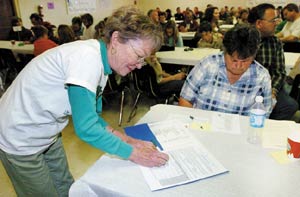Cityhood proponents learned Thursday evening they won’t be
allowed to pick their own consultants for a crucial incorporation
fiscal study.
San Martin – Cityhood proponents learned Thursday evening they won’t be allowed to pick their own consultants for a crucial incorporation fiscal study.
In some counties, such as Riverside, incorporation proponents select their own outside experts for mandated fiscal reports, but Santa Clara County’s Local Agency Formation Commission – which oversees issues of annexations and boundary changes – wants to avoid any hint of impropriety, that the San Martin Neighborhood Alliance is running the process.
“It’s not that we don’t trust them,” said LAFCO analyst Dunia Noel. “Our concern is that the analysis has credibility for LAFCO and other agencies in the county.”
San Martin Neighborhood Alliance members were discouraged by LAFCO’s decision in a meeting with the agency Thursday, feeling the decision could make the incorporation process more expensive and time-consuming.
A comprehensive fiscal analysis is required before San Martin can incorporate, measuring whether the community can support police, fire and other vital services. The study will also show how much tax money the county stands to lose if San Martin becomes a city. It’s the next big piece of an incorporation process that could go before San Martin voters in November 2008.
The neighborhood alliance wanted to have the fiscal study done by September or October, but now the work may have to wait until November or December, said Stu Carson, a member of the cityhood group.
Moreover, LAFCO’s decision to pick the consultant could make the work more expensive for cityhood proponents who’d have to pay the agency to interview candidates. Plus, there’s guarantee LAFCO would pick the cheapest consultant.
Carson said it’s hard to make a definite prediction, but he figures the costs associated with the incorporation process could go up by 50 percent or more, from an estimated $150,000 to $225,000 and beyond. Half of that money, he said, would go toward consultants’ fees, and the other half would go to agencies within the county who will need to devote staff time to the incorporation process.
Tax dollars don’t support incorporation efforts.
The increased costs will make the process more difficult for the neighborhood alliance to fund, but leaders of the grassroots group remain confident they can raise cash in the community. At their monthly meeting last Thursday night, members of the organization formed a committee to generate fundraising ideas. The nonprofit group’s coffers currently contain about $36,000. A payment of $10,000 was recently made to LAFCO to cover verifying signatures on a circulated incorporation petition and other costs.
Carson and other members of the alliance said their relationship with LAFCO – which has never handled an incorporation process before in Santa Clara County – remains positive, despite the difference of opinion on picking consultants.
“We were a bit discouraged … but the overall tone of the meeting was in good spirits,” Carson said.
While Riverside County – which has seen three successful incorporations in recent years – gives applicants more freedom in picking consultants, Santa Clara County’s agency is not bound to do the same. Each LAFCO agency – there’s one in each of the 58 counties in the state – makes its own policies and interprets state laws differently.
But that doesn’t mean Santa Clara County LAFCO officials won’t change their minds in the future. Administrators plan to attend an incorporation workshop in Sacramento Feb. 22, where Riverside’s LAFCO officials will be among the speakers.
“We’ll know quite a bit more walking out of that,” Noel said. “This is our first incorporation … we’re still getting up to speed and getting the ball rolling. We know it’s a very time sensitive process.”








